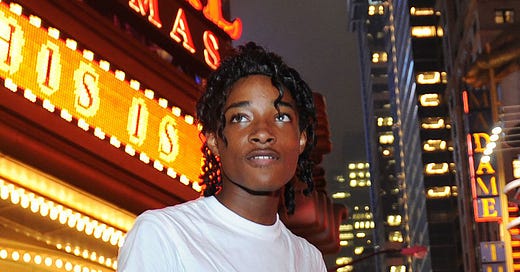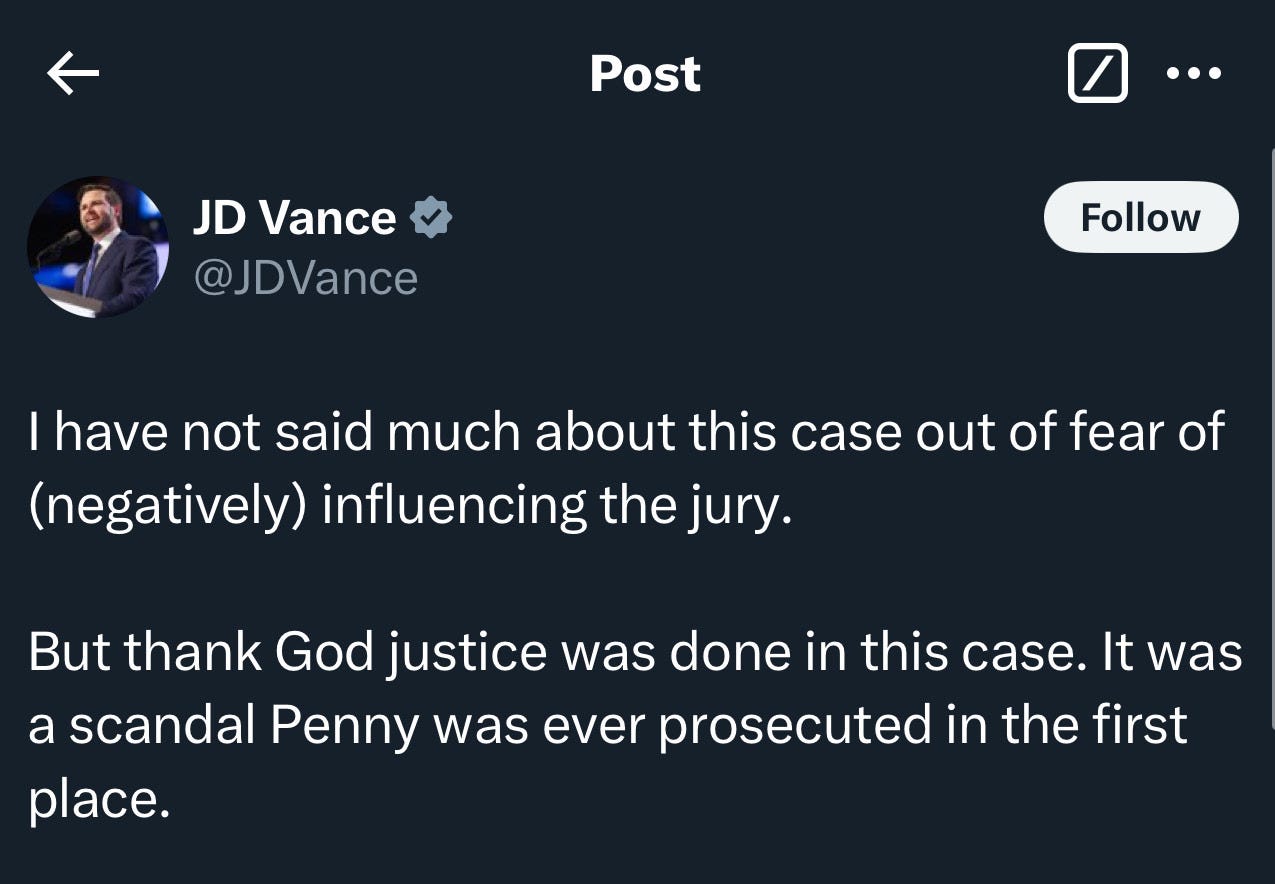The Killing of Jordan Neely and the Conservative Hero Narrative: A Reflection on Justice in America
Daniel Penny's acquittal, the conservative embrace, and what it reveals about America's fractured moral compass.
After a two-month trial, the high-profile case regarding the killing of Jordan Neely, a homeless Black man on the New York City Subway, ended in the acquittal of Daniel Penny, a Marine veteran, on the charge of criminally negligent homicide for placing Neely in a fatal chokehold.
The acquittal brought shock and ire to critics of Penny, as the incident was caught on camera and resulted in widespread protests and renewed attention towards the Black Lives Matter movement. While supporters of Penny, most notably Elon Musk and the administration of President-elect Donald Trump, praised his actions under the perspective of public safety and labeled him a hero. The killing of Jordan Neely has also raised attention towards the failures of New York City to address homelessness and mental illness, something that Neely had faced and struggled with.
The Life and Death of Jordan Neely
Jordan Neely was born in New York City in 1992 and grew up in New Jersey. Growing up, he became known as a Micheal Jackson impersonator and performed in Times Square, and in subway stations.
After his mother was killed by an abusive partner in 2007, he developed major depression, schizophrenia, and post-traumatic stress disorder (PTSD). He was later placed in foster care and would later be hospitalized for mental health issues. In 2019, Neely, who had a lengthy criminal record, was added to New York City’s 'Top 50' list of homeless individuals needing urgent help.
On May 1, 2023, Neely entered a New York City subway train in Lower Manhattan, shouting for help and saying he was hungry, thirsty, and needed a job. Penny, also on the train, initially ignored him. After reportedly hearing Neely make threats to passengers, Penny approached him from behind and placed him in a chokehold. He continued holding Neely even after he stopped struggling and went limp.
Journalist Juan Alberto Vázquez filmed the incident while other passengers warned Penny that he could kill Neely if he maintained the chokehold, he later stopped the chokehold and placed Neely on his side.
After having a faint pulse, officers and medics arrived at the scene to tend to an unconscious Neely and gave him Narcan and CPR. Penny told officers on the scene that he had “put him out” when asked why and how Neely ended up on the floor.
Neely was transported to Lenox Hill Hospital on Manhattan’s Upper East Side, where he was pronounced dead.
The Trial and Acquittal
Following Neely’s death, a medical examiner ruled the cause of death to be a homicide, saying in a CBS News report that Neely died from "compression of neck (chokehold)".
On May 11, 2023, Manhattan District Attorney Alvin Bragg announced that Penny would be charged with second degree manslaughter. A grand jury indicted Penny on an additional charge of criminally negligent homicide.
The trial began in October 2024, with jury selection on October 21, the opening statements began on November 1.
During the trial, Prosecutors acknowledged Penny’s viewpoint that he was trying to protect others but believed that he acted recklessly by applying the chokehold against Neely for several minutes. PBS News reported that a Marine Corps instructor who trained Penny testified that he misused the chokehold technique that he was taught.
While prosecutors never accused Penny of meaning to kill Neely, the manslaughter charge was dismissed. Neely’s father, Andre Zachery, later filed a wrongful death lawsuit against Penny.
The defense for Penny dismissed the medical examiner’s results, using testimony from a pathologist saying that Neely died from combined factors including his sickle cell, synthetic marijuana in his system at the time of his death, his schizophrenia, and the struggle with Penny.
On December 9, Penny was acquitted on the remaining charge of criminally negligent homicide. The trial and the results brought polarized reactions, with many Republicans such as Matt Gaetz and Nikki Haley regarding Penny as a hero and honoring his actions. Following the verdict, Penny was seen smiling at the results of his not guilty verdict while Neely’s family and activists erupted in anger, with Neely’s father Andre being asked to leave the courtroom.
Vice President-elect J.D Vance praised the jury following the verdict and Penny’s actions, posting on X, “Thank God justice was done in this case.”
The “Pseudo Celebrity” Effect
Supporters of Daniel Penny have celebrated him as a 'hero,' continuing a trend of public attention for individuals involved in high-profile killings. Kyle Rittenhouse is another example of the “pseudo celebrity” that became famous in Republican spaces. He first gained attention in 2020 after shooting three men at a Black Lives Matter protest in Kenosha, Wisconsin, two of which died.
Rittenhouse pleaded not guilty to the charges and claimed self-defense, he was later found not guilty and became a symbol of the Second Amendment within conservative circles.
Following the acquittal, Penny has been also embraced by President-elect Donald Trump, after being seen with him and Vice President-elect J.D Vance at the Army-Navy game in Maryland on Saturday.
In an interview with Fox News after the verdict, Penny expressed no remorse for the fatal chokehold and insisted he was protecting passengers that day,
"The guilt I would have felt, if someone did get hurt, if [Neely] did do what he was threatening to do, I would never be able to live with myself," said Penny.
Systemic Failure and the Bigger Picture
The killing and death of Jordan Neely highlight broader systemic failures regarding approaches to homelessness and Black mental health. Reports from The New Yorker reveal that more than 200,000 people in New York City experience severe mental illness, five percent are homeless.
"The fact that someone who took the life of a distressed, mentally-ill human being on a subway could be set free without facing any consequences is shocking, and evidences the City's callous indifference to the lives of those who are homeless and psychiatrically unwell," said Dave Giffen, executive director of the Coalition for the Homeless, in a statement to ABC News.
In public health journal The Lancet, unhoused populations are more likely to be victims of violence and crime than the general population, people who face homelessness are also more likely to struggle with substance abuse disorder (SUD).
The actions of Penny, deemed a “vigilante” by his supporters, have opened broader discussions regarding historical uses of unchecked force used against Black people, as many advocates for Neely referred to his death as a modern-day lynching.
“I stood here ten years ago because they did not give justice to my son with the chokehold," said Gwen Carr, the mother of Eric Garner, a Black man who was choked to death by New York City police in 2014.
“There’s two justice systems,” she added, saying that it would’ve been a “different story” if Neely choked Penny.
The death of Jordan Neely underscores the intersection of mental health crises, homelessness, and systemic inequities that persist in society. As debates surrounding Daniel Penny’s actions continue, advocates emphasize the urgent need for comprehensive reforms in mental health care and housing. Neely’s life and tragic death serve as a stark reminder of the consequences when such systems fail to provide the support vulnerable individuals need.






